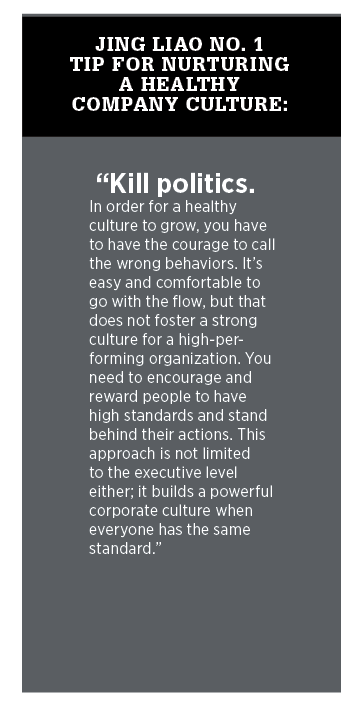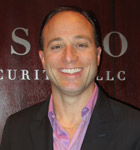Leave it to a chemistry major to help create the perfect formula for corporate culture. And that’s just one of the achievements of Jing Liao, vice president of global human resources for Atmel Corporation, a worldwide leader in the design and manufacture of advanced electronics including microcontrollers and radio-frequency components. With more than 5,000 employees around the globe and approximately $2 billion in annual revenue, Atmel recently endured a challenging restructure and culture transformation. Liao was brought on board as a senior leader to build the human-resources division from the ground up, and now Atmel is known for its winning corporate culture, leading market position in the touch business, and competitive stock growth. Here’s how Liao’s practical approach, 70-hour workweeks, and sometimes unconventional wisdom helped turn around a Fortune 1000 business.
You started out in chemistry, a field far from human resources. How did you make that transition?
Well, it was an interesting transition. I did start out with an undergraduate [degree] in chemistry, and practiced in that field for a short time; however, I found myself drawn to other interests. I returned to school to pursue my graduate degree in human resources and industrial relations from the University of Minnesota, Carlson School of Management. I found I had a passion for people, and I also found that my scientific background gave me a solid foundation for my new profession. I believe the ability to balance a logical, analytical approach with more subjective, psychological methods is the key to success in this field.
How did your first job in human resources help shape your career?
I was incredibly lucky to start my human resources career at Cargill, one of the world’s largest privately owned companies, in their human resources leadership-development program. The opportunity was an incredible experience for me because I was able to take the theories I’d learned in school and apply them in practical, working applications. From designing employee satisfaction surveys to implementing global policies, I worked closely with top-notch executives, PhDs and consulting firms and learned more than I’d ever imagined.
You came on board at Atmel during a turbulent time. Did you have any concerns?
Actually, I found the situation very compelling. My only desire was to be part of a winning team and contribute to a great turnaround success story. Going in with an open mind and a desire to succeed rewarded me with endless opportunities to challenge myself, my team, and to further my skills and experience. Our initial focus was developing the basic human-resources infrastructure. We started from scratch but, unlike a new company, we had to navigate the realm of human emotions brought on by dramatic change. We followed quite traditional steps to construct all the building blocks of human resources. We went from crawling to standing up, then to running really fast with a core foundation of winning corporate culture.
Where do you start when developing a successful corporate culture?
First of all, corporate culture should not be driven by human resources. The base of the corporate culture needs to be what the leadership team believes is important to the success of the company. At Atmel, we took our time to really assess, identify, and establish the values we felt were important. Then the human-resources team started to build our entire talent-management life cycle based on those core values so we would have a consistent approach for the entire company when it comes to managing our key talents.
What has been your best business decision at Atmel?
A colleague once said “HR is the police of corporate culture,” and I realized that statement is very true. I personally hold my team accountable for being role models to promote, communicate, and demonstrate corporate culture. Based on this belief, I started a global business-partner model at Atmel where a human-resources staff member partners with executives at all levels to provide consistent support. In turn, human resources is involved at every single decision point, which allows us to relentlessly drive and promote corporate culture.
What motivates you?
What excites me is seeing that I am helping the business I work for “win.” I never worry about my role in the company because as long as I work hard and do what I am supposed to be doing, I know I will succeed. What frustrates me is when people start to settle. Endless opportunities present themselves to us because we allow ourselves to have an open mind to possibilities. If you allow yourself to learn and grow, the sky’s the limit.


